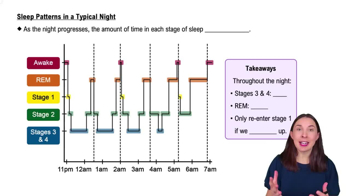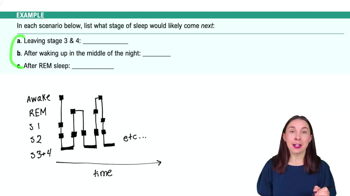Table of contents
- 1. Introduction to Psychology1h 43m
- 2. Psychology Research2h 20m
- 3. Biological Psychology2h 41m
- 4. Sensation and Perception28m
- 5. Consciousness and Sleep32m
- 6. Learning41m
- 7. Memory34m
- 8. Cognition37m
- 9. Emotion and Motivation35m
- 10. Developmental Psychology33m
- 11. Personality48m
- 12. Social Psychology41m
- 13. Stress and Health41m
- 14. Psychological Disorders44m
- 15. Treatment47m
5. Consciousness and Sleep
Sleep
Struggling with Psychology?
Join thousands of students who trust us to help them ace their exams!Watch the first videoMultiple Choice
Which of the following situations best demonstrates waking consciousness?
A
Derrick brings his car to a sudden halt as he notices that the light has already turned red.
B
Luciana wobbles just a bit as she tries to walk after drinking three glasses of wine.
C
Orlando carefully calculates his taxes two weeks before taxes are due.
D
Helena fights to keep her eyes open as she reads a bedtime story to her children.
 Verified step by step guidance
Verified step by step guidance1
Understand the concept of waking consciousness: Waking consciousness refers to the state of being awake and aware of one's thoughts, feelings, and surroundings. It involves active engagement and cognitive processing.
Analyze each situation to determine the level of awareness and cognitive engagement: Consider how each scenario reflects the characteristics of waking consciousness.
Evaluate Derrick's situation: Bringing a car to a sudden halt requires quick reflexes and awareness, but it may not involve sustained cognitive processing.
Evaluate Luciana's situation: Wobbling after drinking indicates impaired consciousness, which is not representative of waking consciousness.
Evaluate Orlando's situation: Carefully calculating taxes involves deliberate thought, planning, and awareness, which are key aspects of waking consciousness.

 3:25m
3:25mWatch next
Master Circadian Rhythms with a bite sized video explanation from Hannah Gordils
Start learningRelated Videos
Related Practice


































































































![Race, Genes and IQ Differences | Bret Weinstein [Mini Clip]](https://img.youtube.com/vi/IztL_m3pd70/mqdefault.jpg)

